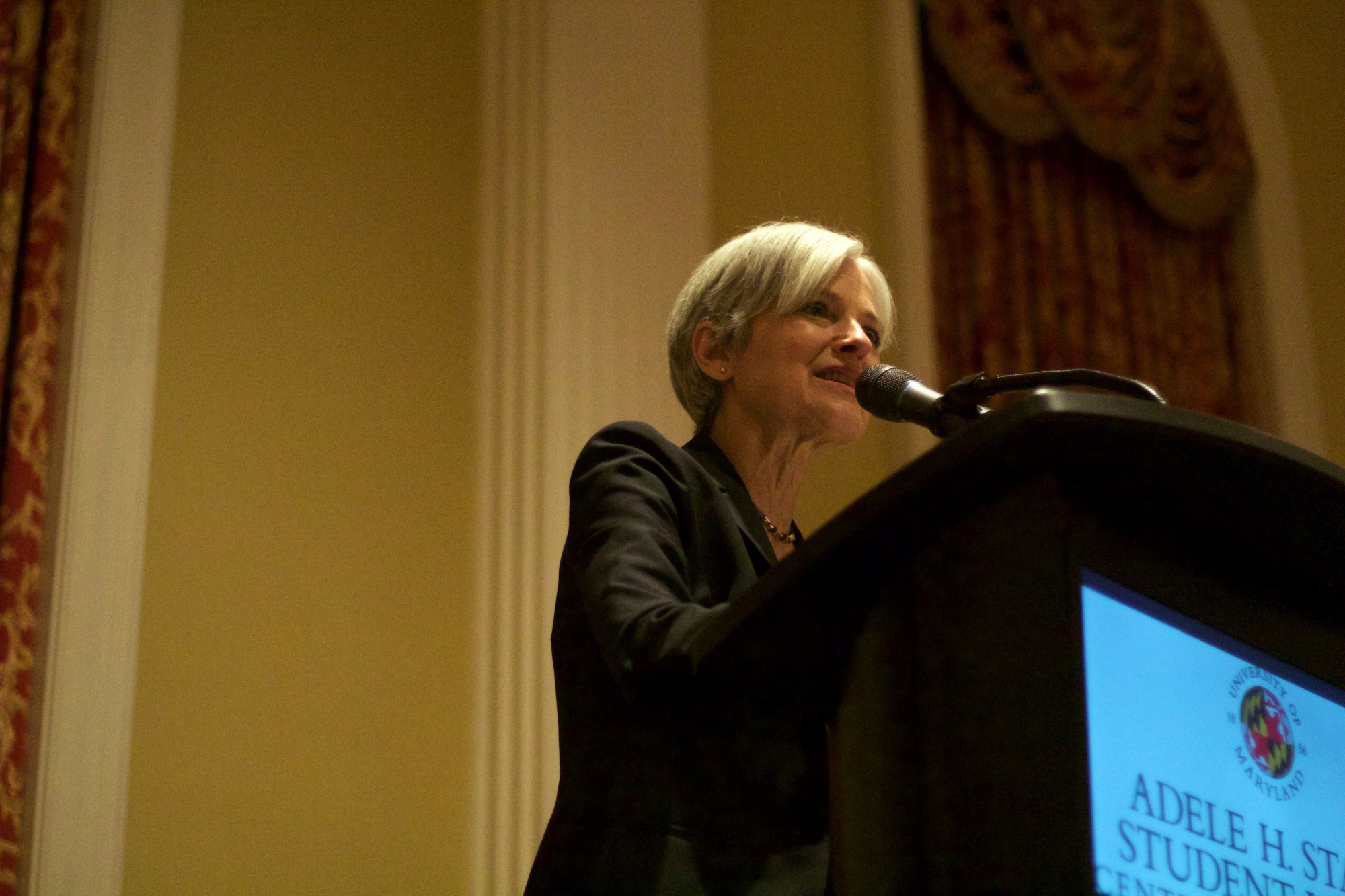With Election Day just two days away, Green Party presidential candidate Jill Stein and vice presidential candidate Ajamu Baraka discussed their party’s platform on climate change, jobs, criminal justice reform and other issues at a rally at the University of Maryland on Sunday, telling attendees that they don’t need to vote for the “lesser of two evils.”
About 300 people attended the rally in Stamp Student Union. The speakers focused largely on the Green Party platform and the value of third parties, as opposed to Stein’s candidacy specifically.
The most recent Election Project poll, completed Friday, has Stein polling at 2.2 percent. “You are what democracy looks like, UMD!” Stein said. “You’re what democracy looks like and you’re what democracy acts like.”
Stein spoke about the broad effects of climate change and her party’s ideas for a “Green New Deal,” which would implement an emergency jobs program and work to solve climate change. The Green New Deal would create 20 million jobs in renewable energy and a sustainable, relocalized organic food system, Stein said.
The presidential candidate also supports the legalization of marijuana, opposes incarceration for nonviolent drug offenses and would like to end “high stakes” testing in public schools, she said.
Though Stein didn’t focus on the prospects of a Green Party win on Tuesday, she stressed that getting five percent of the vote guarantees retroactive federal funding for the party.
“Getting to five percent of the vote makes all the difference,” Stein said. “What it means is we hit the ground running, because we have automatic ballot access then in most states.”
Stein said this campaign season has been characterized by “fear mongering,” but that the fear campaign has backfired and led to greater Green Party support.
“We will not be good little boys and girls and keep voting for the parties that have thrown [us] under the bus,” she said.
The rally, sponsored by the International Socialist Organization, took place so close to Election Day partially because of Stein’s schedule, said Brendan Sullivan, sophomore civil engineering major and president of this university’s ISO chapter. But the rally also served as “a last hurrah of the campaign,” making a “bold statement” about the need for a third party in America, Sullivan said.
Baraka discussed the connection between class and race, and told attendees the Green Party will not fight for its constituents, but with its constituents. The party’s efforts won’t end of Nov. 8, he said, regardless of who wins.
“This campaign, this mission, this is about building real authentic power,” he said. “It’s about shifting the power stolen from us by the one percent, building that power back to us where we can have a real democratic process and democracy here in this country.”
While implementing the Green Party platform won’t solve all of the country’s problems, Baraka said it would be an improvement.
Maryland Green Party co-chairman Michael Cornell, of the state coordinating committee, and Green Party senatorial candidate Margaret Flowers also spoke at the rally.
Though the rally largely emphasized not voting for “the lesser of two evils,” sophomore biology major Harrison Cann still considers a third-party vote to be “wasted.”
“Based on the two-party system we have and the way that the media kind of portrays the other parties … it’s not really going to make a difference,” he said.
Sophomore government and politics and economics major Ethan Navarre shared similar feelings, saying he believes the U.S. system should change so that a third-party vote isn’t a “spoiler vote.”
Though Narrave already voted, he came to the rally to learn about Stein’s policy.
“Especially in this election, it’s a voiceless vote but a deserved one,” Navarre said. “I didn’t vote for Jill Stein but I have a lot of respect for people who did … I think they’re voting their conscience.”
Sullivan also stressed that the choice isn’t just between two widely-disliked candidates. An ABC News-Washington Post poll in August found Hillary Clinton and Donald Trump to be the most unpopular presidential candidates in more than 30 years of polling.
“You can choose to want a better future, and you aren’t a hopeless visionary,” he said. “You’re not bad for wanting something that’s better than the lesser of two evils.”



